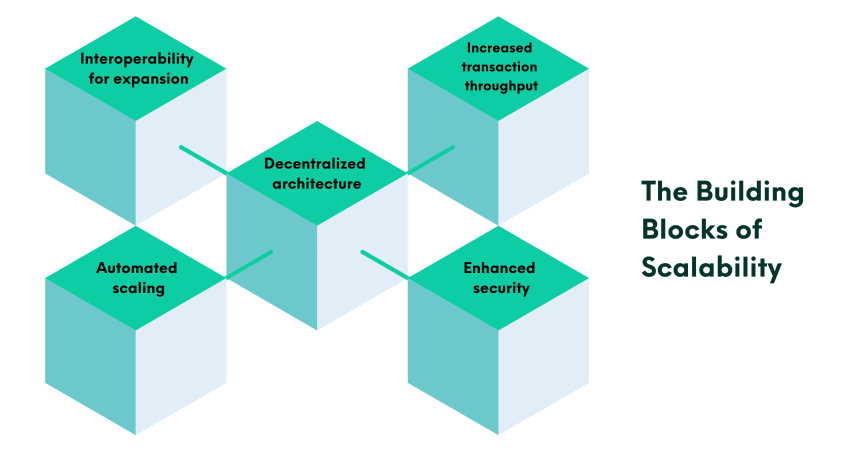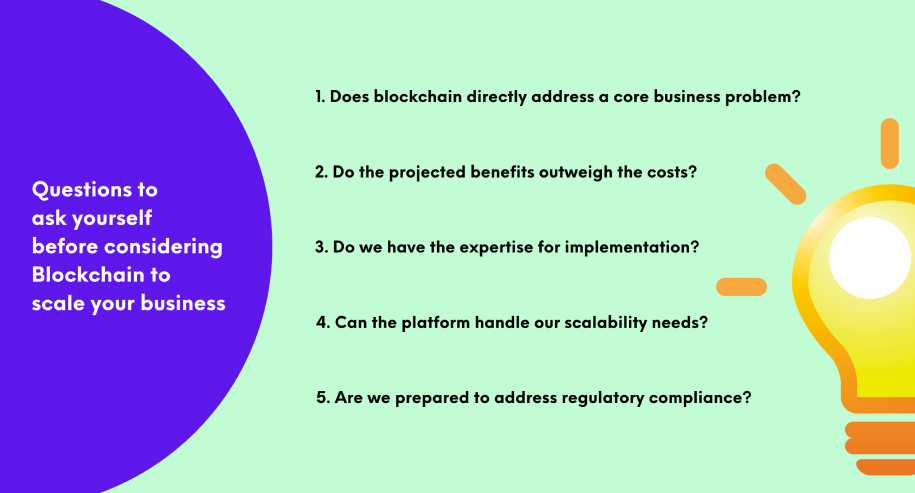How Blockchain Helps in Scaling Startups
- | 9 minute readProduct Scaling


In the dynamic realm of startups, particularly within the tech and SaaS sectors, the ability to scale effectively is not just an advantage—it’s a necessity for survival and success.
Amidst a plethora of technological advancements promising to elevate startups, blockchain emerges as a standout.
Moving beyond its renowned application in cryptocurrencies, blockchain presents a sturdy platform for growth, innovation, security, and operational efficiency.
If you’re looking to expand, grasping the potential of blockchain could unlock doors to growth like never before.
This piece aims to demystify blockchain and illuminate how it can serve as a pivotal element for startups wrestling with the complexities of scalability.
Let’s begin.
At its essence, blockchain is recognized as a distributed ledger technology.
Picture a digital ledger that, unlike traditional ledgers, is not housed in a single location but is duplicated across numerous computers in a network. This decentralization is the hallmark of blockchain, ensuring an elevated level of security and transparency.

Each transaction within a blockchain is encapsulated in a ‘block’, which is linked to preceding and succeeding blocks, thus creating a chain.
The outcome is a secure, chronological, and tamper-proof record of transactions accessible to all network participants but owned by none.
For startups, the intrinsic properties of blockchain—decentralization, immutability, and transparency—can effectively mitigate many growth-related challenges.
The shift away from centralized systems reduces potential failure points and bottlenecks.
The immutable nature of blockchain guarantees the integrity of transactions, enhancing trust among users. Moreover, transaction transparency can bolster credibility and streamline operations, elevating process efficiency.
For a startup like yours, these qualities can translate into a plethora of benefits.
From securing data to optimizing supply chain management and enabling transparent transactions, blockchain can significantly improve a startup’s operational efficiency. Its capacity to manage extensive data securely and efficiently positions it as a viable option for startups aiming to scale without compromising security or operational integrity.
In the next sections, we will explore the scalability challenges startups face and how blockchain presents a feasible solution.
Scaling a startup is quite similar to navigating through a labyrinth; it demands a delicate balance between meeting market demands and ensuring the infrastructure can sustain rapid expansion.
The real puzzle lies in adopting systems that not only perform efficiently at a smaller scale but can also seamlessly adapt to larger operations without faltering. This is where the strategic integration of technology becomes indispensable.
Blockchain emerges as a saviour in this context, with its promise of swift and secure transaction processing. Its decentralized architecture ensures that as the network burgeons, it becomes not just more resilient but also more adept at handling the increased load.
Blockchain’s scalability isn’t confined to merely managing a growing number of transactions; it also includes maintaining security and operational efficiency amidst this expansion.

Blockchain has become popular for helping startups grow because it has unique features that support fast-growing businesses in many important ways.
Its features include:
Incorporating blockchain into your startup’s growth strategy can be a game-changer. Nonetheless, it’s crucial to assess your business’s specific needs and the suitability of blockchain technology to meet those requirements.
Startups considering blockchain as a scalability solution must understand the nuances of various blockchain platforms to ensure their success.
Blockchain’s reputation is often tied to cryptocurrencies like Bitcoin, but its potential applications span far broader and deeper across various sectors.
This technology offers innovative solutions to longstanding challenges, proving transformative across industries.
These examples highlight blockchain’s versatility in addressing challenges across various industries. For startups, leveraging such a multifaceted tool can significantly aid in scaling operations and penetrating new markets.
Before integrating blockchain into your growth strategy, it’s crucial to evaluate its alignment with your startup’s objectives and operational needs.

Here are essential considerations:
Making the decision to adopt blockchain technology requires a comprehensive analysis of these factors to ensure it’s the right strategic move for your startup.
While blockchain presents numerous advantages, startups may encounter challenges during its adoption. Addressing these challenges head-on is key to successful integration:
Navigating these challenges with strategic planning and expertise can unlock blockchain’s potential for your startup, facilitating secure and efficient scaling.
Wrapping up, blockchain technology presents a compelling solution for startups facing scalability challenges. Its unique features — from enhancing transaction throughput to ensuring security and trust — make it an attractive option for startups looking to grow efficiently and securely.
As we’ve discussed, the versatility of blockchain extends far beyond cryptocurrencies, offering innovative solutions across various industries. However, the decision to integrate blockchain should be a strategic one, aligned with your startup’s long-term goals and operational needs.
It’s important to weigh the benefits against the challenges, considering factors like technical complexity, scalability needs, regulatory compliance, and integration with existing systems.
For startups at the forefront of innovation and growth, blockchain can be a strategic partner in your journey to scalability. As you consider your options, remember that informed decisions and strategic partnerships are key to successful technology adoption.
We, at CompileCrew, remain committed to guiding startups like yours through their scalability challenges, offering expertise and tailored solutions that align with unique business objectives.
If you’re exploring scalability solutions or seeking guidance on your growth journey, feel free to reach out to us. We’re here to provide you with all the support you need!

Sheena is a growth hacker at CompileCrew. She loves everything about technology and startups. When she’s not in strategy mode, you’ll find her recharging with some rock and metal music.